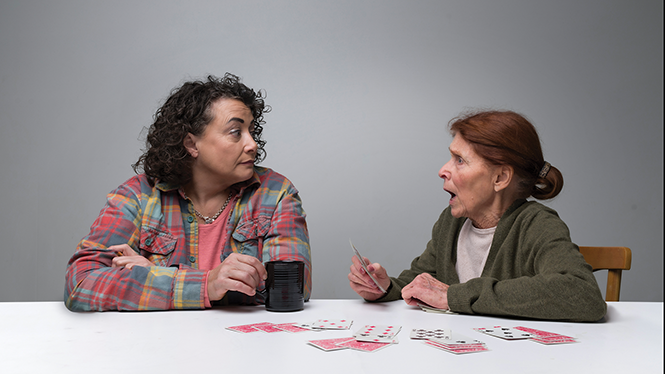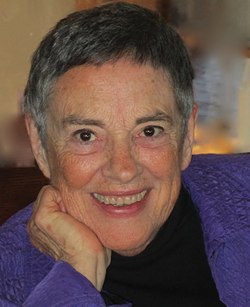Theater preview: Last Lists of My Mad Mother at Pygmalion Productions
Playwright Julie Jensen discusses how her play hits her differently 25 years after its premiere
By Scott Renshaw @scottrenshawMore than 25 years ago, when Salt Lake Acting Company staged the Utah premiere of Last Lists of My Mad Mother—Julie Jensen's play inspired by her own mother's struggles with Alzheimer's at the end of her life—Jensen saw the play from the point of view of Dot, the daughter/caregiver character. Now, at the age of 81, with Pygmalion Productions mounting a new production, Jensen has a different perspective.
"A typical play is really about the younger person, in one way or another, defeating the parent, taking the place of the parent," Jensen says. "And there are 100,000 stories of that kind of thing. ... Now when I look at [the play], I see it much more from the older woman's point of view. Because my friends are losing their beans, in nursing homes, being cared for by devoted people. This has a different resonance for me now."
Back in the 1990s, when Jensen was still teaching playwrighting at the University of Nevada-Las Vegas, it wasn't entirely clear to her that this story would become a play at all. As she recalls, she had pages of notes that she had compiled about her own experiences with her mother. She remembers showing them to a colleague who said, "Staple it together and make it a play."
At the time, stories dealing with the experience of Alzheimer's weren't common, Jensen says, "and that was my motivation for it. While this is not specifically my mother's story, or mine, or my sister's, I could see other people having that struggle, too. ... When SLAC did its first production, the whole production was arranged around the notion of Alzheimer's and what it was, a panel discussion. It was very much a topical play, and it was unique; they hadn't had that subject out there."
Subsequently, Last Lists of My Mad Mother has become one of Jensen's most-produced plays, even crossing cultural barriers to be staged in places like Turkey. "Every year, I get a check from Turkey," she says with a laugh. "I don't know if it's running there continuously, or every year. It's kind of a tear-jerker, so I guess they can kind of make it work."
Yet for all those productions, Jensen believes there's still something distinctive and original in the approach taken by director Morag Shepherd for this latest interpretation by Pygmalion Productions—one that builds on the play's foundation dealing with an unreliable memory. "Dot narrates a lot of what's going on, interprets it for you," Jensen says. "But the physical blocking of the play bears no resemblance to those kinds of details. It's very abstract—and it calls attention, to me, to what she's saying relative to what you're seeing. It's a reminder that your memory is so corrupt in a way, and not reliable. You believe the emotional thing of it, but you're not sure of the details. And I love it, I think it's brilliant."
With as much as has changed over the years since Last Lists of My Mad Mother premiered, Jensen expresses some frustration over how much hasn't changed—both in dealing with conditions like Alzheimer's medically, and dealing with them culturally. "We had some hints of things over the years, but the only thing that has changed is, you can diagnose it with a blood test," Jensen says. "Well, isn't that sweet—now you know this thing is coming. But what they've really done nothing about is, what can end-of-life be that isn't quite so agonizing, and stupidly expensive, and emotionally fucked-up. In fact, I think we've gotten worse. With the conservatives around, those kind of questions get further away. ... Some places, like Oregon, do have laws, and that's something. But it's not enough."
Jensen does have her own list for what she might want to have changed in the world should there be a 50th anniversary production of Last Lists of My Mad Mother, where the subject matter of the play is concerned, including more autonomy concerning end-of-life choices. "I would love us to be able to put on a list the conditions under which we would like help going, and that would be respected and carried out," she says. "I would hope obviously that we would have some way of avoiding or treating Alzheimer's when it struck. In some weirdly radical way, I think we're living too long—including me. It would be a gift if we could get to the point where we said to one another, 'Let's not try to live to 100. Let's live well until 80.' We're living so long, and not necessarily well."
More by Scott Renshaw
-
Film Reviews: New Releases for April 26
Challengers, Boy Kills World, Humane, Alien 45th anniversary
- Apr 25, 2024
-
CHALLENGERS feature movie review
Zendaya centers a romantic triangle with a unique relationship spin
- Apr 24, 2024
-
Film Reviews: New Releases for April 19
The Ministry of Ungentlemanly Warfare, Abigail, The Beast, Hard Miles, Sasquatch Sunset and more
- Apr 19, 2024
- More »
Latest in Arts & Entertainment
Readers also liked…
-
New TV for January 2023
Mayfair Witches, Velma, The Last of Us, Poker Face and more premieres
- Jan 4, 2023





